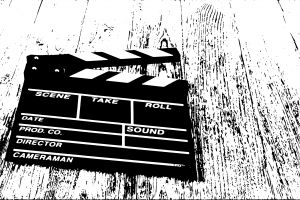PLOT germs have taken up quite a bit of our time in this new series of thoughts on the writing of photoplays. And rightly so. For, unless you know where to look for plots, and how to recognize a possible plot in embryo, how are you going to construct them?Let’s proceed a step further along our path. Having discovered the germ of a plot, how are we going to develop it into a full grown, vigorous, structure? What is the prime necessity? What magic touch infuses life and strength into the bare idea we possess and makes of it something that will hold the interest of others, that will entertain them?
Let’s proceed a step further along our path. Having discovered the germ of a plot, how are we going to develop it into a full grown, vigorous, structure? What is the prime necessity? What magic touch infuses life and strength into the bare idea we possess and makes of it something that will hold the interest of others, that will entertain them?
Speaking generally, and leaving to later discussion the narrower by-ways and paths of plot development, we may set down as the primary essential of a plot the basic element—struggle. Your plot germ, your original idea, is usually an out of the ordinary character or an incident that concerns ordinary characters in an unusual manner.
Into this source you must inject—struggle. Some will call it conflict, others will tell you that suspense is the necessity. But suspense is the outgrowth of struggle or conflict.
There is struggle of varying sorts. Your struggle may be that between the different characters of your story, it may be the struggle of one of your characters against conditions of life and the world, it may be the struggle of your character with his own inner self.
But it is struggle of one sort or another that makes your story. Barring the few exceptions whose existence we have noted, and which we will describe and study later, it is the tale of struggles that makes up the entertainment of the world.{32}
The spectator who comes to see a motion picture, or the reader who picks up a book, expects to be introduced to an interesting character, one whom he will either like very much or dislike very much. After hearing your premises they expect to witness a struggle, the further progress in life of your character and necessarily the sort of progress that brings struggle. Your character may be the most interesting one in the world, but two hours talk about his unusual points will not satisfy anyone. Those two hours must concern things that are happening to your character or events that he is causing to happen—that is, the element of struggle.You will remember that last month, in discussing the possible plots to be discovered in newspapers, we found a germ in the “Letters From Readers” column. It was an epistle signed “Lonesome,” and was from a young man who wanted to know why the big city did not provide some sort of welfare club or association where a stranger could meet and become acquainted with other persons?That word “Lonesome” aroused our curiosity. It would likewise interest an audience. Imagine Charles Ray in the character. We see him fresh from the country, in his little hall-room, life, hustle and bustle all around him. But to Charlie they mean nothing; he has none in the length and breadth of the city to call “Friend.”
You will remember that last month, in discussing the possible plots to be discovered in newspapers, we found a germ in the “Letters From Readers” column. It was an epistle signed “Lonesome,” and was from a young man who wanted to know why the big city did not provide some sort of welfare club or association where a stranger could meet and become acquainted with other persons?That word “Lonesome” aroused our curiosity. It would likewise interest an audience. Imagine Charles Ray in the character. We see him fresh from the country, in his little hall-room, life, hustle and bustle all around him. But to Charlie they mean nothing; he has none in the length and breadth of the city to call “Friend.”
That word “Lonesome” aroused our curiosity. It would likewise interest an audience. Imagine Charles Ray in the character. We see him fresh from the country, in his little hall-room, life, hustle and bustle all around him. But to Charlie they mean nothing; he has none in the length and breadth of the city to call “Friend.”
When you have introduced such a character you have the audience with you. But you must go further. The audience wants to see Charlie struggle against his environment, or, out of his despair they wish to see him perform some rash act that will force a struggle on him.Comedy or drama can be developed from such a theme—by the injection of struggle. The chances are you will bring to light that most artistic and desirable of blends{33}—comedy-drama. Suppose that our “Lonesome” youngster, suddenly grown rash, forms a decision. “I’m going to walk out that door,” he says, “and speak to the first person I meet. I don’t care whether it’s John D. Rockefeller or a street sweeper, I’m going to tell him I’m lonesome and want someone to talk to who will speak about something beside the weather.”There’s the start of your struggle. Why, it’s a funny struggle alone to see Charlie walking the room, trying to screw up his determination to go through with the rashly made resolution. Finally he strides forth bravely.
Comedy or drama can be developed from such a theme—by the injection of struggle. The chances are you will bring to light that most artistic and desirable of blends{33}—comedy-drama. Suppose that our “Lonesome” youngster, suddenly grown rash, forms a decision. “I’m going to walk out that door,” he says, “and speak to the first person I meet. I don’t care whether it’s John D. Rockefeller or a street sweeper, I’m going to tell him I’m lonesome and want someone to talk to who will speak about something beside the weather.”There’s the start of your struggle. Why, it’s a funny struggle alone to see Charlie walking the room, trying to screw up his determination to go through with the rashly made resolution. Finally he strides forth bravely.
There’s the start of your struggle. Why, it’s a funny struggle alone to see Charlie walking the room, trying to screw up his determination to go through with the rashly made resolution. Finally he strides forth bravely.Whom does he meet?
Whom does he meet?
There’s where your genius as a story teller comes in. What sort of a character would O. Henry have him meet? Start a Harold McGrath story off with this theme. The story will be running away with you—if your imagination is in working order.The simplest form of struggle is that of the eternal triangle—two men for a girl, or the conflict of two women for one man. The struggle that develops out of your “Lonesome” story may eventuate in that sort before it gets very far. But you can see that you have started on more original ground, that if you follow these paths you will not have simply an “eternal triangle” story.
The simplest form of struggle is that of the eternal triangle—two men for a girl, or the conflict of two women for one man. The struggle that develops out of your “Lonesome” story may eventuate in that sort before it gets very far. But you can see that you have started on more original ground, that if you follow these paths you will not have simply an “eternal triangle” story.That has been our reason for withholding mention of “struggle” to this point. There are those who would tell you of this basic essential before any other point had been discussed. The result is that so many amateurs set out to write stories by seeking for a struggle. They look over the list of various sorts of struggles, two men for a girl, two girls for a man, man against poverty, man against temptations, and so on. And when the alleged story is completed it is merely a framework, without{34} life or soul. Stilted characters struggle through time-worn situations.
That has been our reason for withholding mention of “struggle” to this point. There are those who would tell you of this basic essential before any other point had been discussed. The result is that so many amateurs set out to write stories by seeking for a struggle. They look over the list of various sorts of struggles, two men for a girl, two girls for a man, man against poverty, man against temptations, and so on. And when the alleged story is completed it is merely a framework, without{34} life or soul. Stilted characters struggle through time-worn situations.“Struggle” may be classified and indexed. But “plot germs” cannot; the plot germs that you can discover are limited only by your own experience, your own reading, your own imagination. And if you set out to write your story by searching for the germ that is unusual, interesting, the chances are in your favor in securing originality—something different. Because your own life, your own viewpoint is something different. It is yours as long as you keep it yours, it is going to become trite only when you grow lazy and follow the lines of pictures and stories you remember because that is the easy way.
“Struggle” may be classified and indexed. But “plot germs” cannot; the plot germs that you can discover are limited only by your own experience, your own reading, your own imagination. And if you set out to write your story by searching for the germ that is unusual, interesting, the chances are in your favor in securing originality—something different. Because your own life, your own viewpoint is something different. It is yours as long as you keep it yours, it is going to become trite only when you grow lazy and follow the lines of pictures and stories you remember because that is the easy way.Starting with a germ that is different the “struggle” you provide is going to be different, because it is going to be the sort of struggle that could happen only to your different characters.
Starting with a germ that is different the “struggle” you provide is going to be different, because it is going to be the sort of struggle that could happen only to your different characters.
There’s the basis of originality—your own life, your own heart, your own mind.


